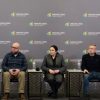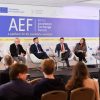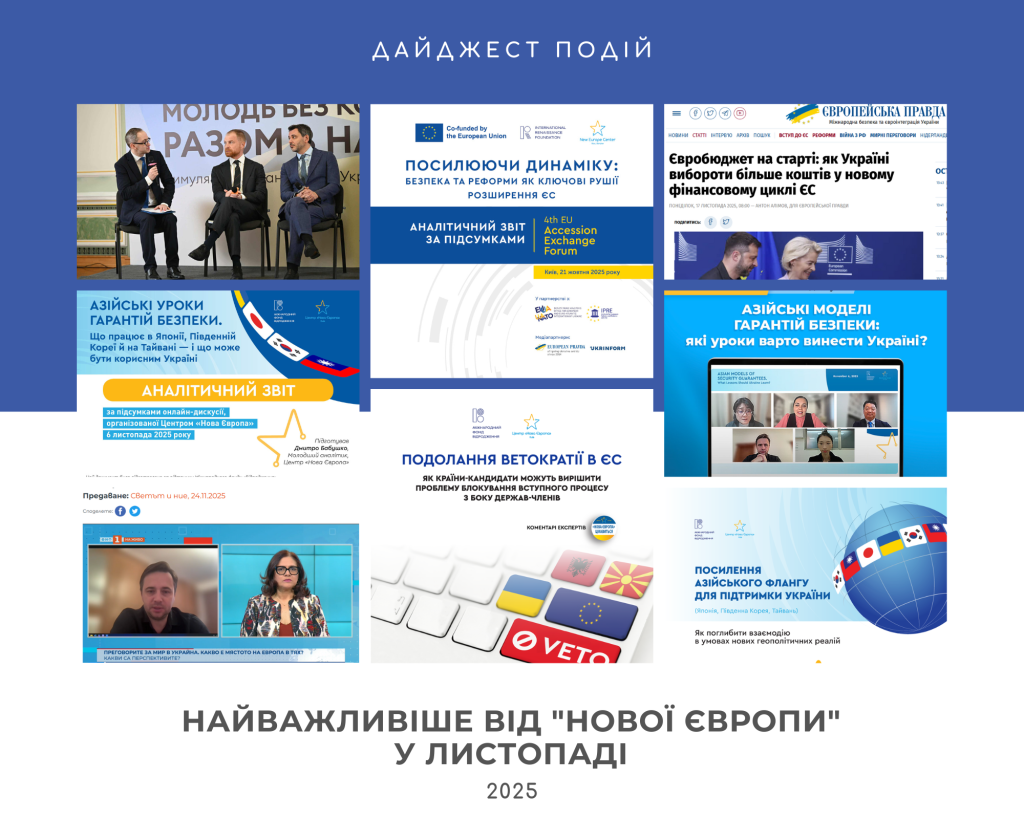Alyona Getmanchuk, Director of the New Europe Center took part as a speaker in the Atlantic Council online-event “Walking a tight rope, one year of Zelenskyy’s foreign policy”, which took place on May, 13 at 19 p.m. (Kyiv time).
Other speakers of the event:
- Bohdan Nahaylo, a British-Ukrainian journalist and veteran Ukraine watcher based in Kyiv;
- Ambassador Steven Pifer, William J. Perry Fellow at Stanford University’s Freeman Spogli Institute for International Studies and nonresident senior fellow at the Brookings Institution;
- Minister Andriy Zagorodnyuk, former minister of defense of Ukraine, discuss Zelenskyy’s foreign policy during his first year in office;
- Moderator: Ambassador John Herbst, director of the Atlantic Council’s Eurasia Center.
The record of the event is available here:
Speech by Alyona Getmanchuk
Taking stock of the first year of Zelenskyy’s presidency, I would say that probably the main thing is not what Zelenskyy has really done, but what he has not done. He has not challenged, for example, Ukraine’s integration to the European Union and to NATO, he has not accepted Putin’s terms on Donbas settlement, at least as for now. Even if he wanted to do something of that, he proved unable to neglect reaction of Ukrainian society and Ukrainian parliament, including his own political party “Sluha narodu”.
Here we should not forget the simple fact that all Ukrainian revolutions or “Maidans”, as we call them in Ukraine, were held in support for “Ukraine in Europe” idea, none of them was held in support of closer relations with Russia. That means that no matter how strong the sentiments towards peace with Russia are, they are unable, especially since beginning of Russian aggression in 2014, to bring hundreds of thousands of Ukrainians on the streets in support of the idea of closer relations with Russia. While opponents of another rapprochement with Russia would be ready to go in the streets as soon as they feel that Zelenskyy is able to sell Ukraine to Putin.
Yes, Zelenskyy’s foreign policy has been strongly subordinated to his electoral promise to end the war in Donbas. However, at this rather initial step of peace talks with Moscow it has not affected much Ukraine’s Euro-Atlantic choice. I have no doubt that at more advanced level of negotiations with Putin the issue of Ukraine’s integration to the EU and especially to NATO will definitely pop-up in quite predictable way.
So if you ask me, if these to aims: to end the war in Donbas and to integrate with the West are compatible, I would say rather no. At least, while Putin is in Kremlin. Even now we see Zelenskyy’s clear political leadership on Donbas issue, but we do not see his clear political leadership on the EU and NATO, at least I do not see that.
Also we could say that Zelenskyy’s peace strategy, if we can call it a peace strategy, significantly complicated Ukraine’s positioning. Under President Poroshenko everything was more or less clear: Ukraine was a victim of Russian aggression, Ukraine needs assistance, support and allies. The world was divided into two camps: the aggressor, which is Russia and its mostly marginal associates, and Ukraine, as a victim of aggression and its mostly respectable allies. Now the picture is much more complicated.
What we have also been witnessing is a clear attempt of Ukrainian president to refocus Ukraine’s foreign policy from the search for allies to the search for investors. Yet, as a result it looks like we have not secured neither new powerful allies, nor new strategic investors, at least for now.
Among Zelenskyy’s foreign policy achievements, I would name the improvement of Ukraine’s relationships with our Western neighbors, especially with our strategic long-term partner Poland. There is a good chance also to improve relations with Hungary. They were two most problematic cases under Poroshenko presidency, that is why I think it’s important to mention those two countries. It means that even modest achievements in relations will be quite visible and I think it is a good chance to create a sort of foreign policy success story here.
Another positive development is a nomination of experienced professional diplomats for key positions in Ukrainian diplomacy. Even in the US now you have Volodymyr Yelchenko and Sergiy Kyslytsya, who are well-known professional Ukrainian diplomats. At the same time, Zelenskyy’s skepticism toward diplomacy and diplomats in general remains a serious challenge, as well as his self-imposed deadlines, especiallt deadline on Donbas negotiations.
To summarize, I would say that Zelenskyy’s mixture of Donbasization and economization as his foreign policy strategy turned out not to be very effective so far. Still, he still has time to deliver on that or may be to suggest some amendments to this strategy.
Questions
On Donbas:
- We should prepare ourselves to another protracted conflict, this time on Donbas
- Zelenskyy promised to end the war, but it turned out that Ukrainians don’t want Zelenskyy to end the war at any price. They want him to win the war or at least not to lose it.
- Even among voters of his political party “Sluha narodu” the most popular idea is to temporarily freeze the conflict, not to solve it at any price. The problem is that with joint border with Russia and Putin’s inclination to use escalation as an invitation to negotiations it is almost impossible to freeze it.
On the USA:
- The US remains #1 bilateral partner for Ukraine.
- Our bilateral agenda is still being trapped by impeachment saga. I have to admit that perception of the US as Ukraine’s reliable ally has deteriorated recently. The US stance as major reform driver has been also undermined by demands from the White House to conduct certain investigations.
- Not only Ukraine became toxic in Washington, the US became to certain extent toxic in Kyiv. Much less high level officials would like to deal with American profile.
- Ukraine is currently sticking to “wait and see” strategy. In current political situation it is maybe one of the best strategies. There is more and more understanding that no progress could be achieved until the US elections. Let me mention one example. American partners including Mike Pompeo in person promise to Ukrainian counterparts to appoint a special representative on Ukraine’s negotiations and have not managed to deliver on that.
- The good news is a nomination of Keith Dayton as an Ambassador to Ukraine. For us the nomination for Ambassador’s position of a retired general and strategic adviser to defense ministry is a sign and a recognition from the US side that security plays important role in our relations and ongoing war in Eastern Ukraine is not forgotten.
- We were a little bit puzzled that Ukraine was absent in two recent statements, both in Trump-Putin statement of 75th anniversary of the meeting in Elbe and the US Bucharest 9 statement.
Due to time constraints, panelists were unable to address all of the questions posed by the audience during the event itself. Please find the responses to a selection of these questions here.








